Loot of the World

Fate of Detroit's premier art museum serves warning to the nation
By Emma Lockridge
The collective spirit of financially beleaguered Detroiters mirrors a declaration from Celie in The Color Purple: "I'm poor, black, my situation is ugly, but God, I'm still here." While the people stay put in Motown, will the city's art museum survive a fiscal meltdown or be dismantled?
In response to ongoing deficits and long-term debt, Michigan Gov. Rick Snyder (R) has used an unpopular state law to appoint an Emergency Manager [EM] to right the ship in Motown. The EM supplants Detroit's elected officials, including the mayor and city council, and can renegotiate union contracts, eliminate departments, declare a municipal bankruptcy and sell city-owned assets.
Assets? The Detroit Institute of Arts, one of the nation's finest urban museums and a most beloved gem for Detroiters, could be put into play. People are concerned that the museum's coveted collection could fall prey to art vultures to lower the city's deficit. With more than a billion dollars in city-owned artwork that includes Van Gogh, Monet and Cézanne, speculation is brewing about whether the art would be sold, or pillaged as some think, to help meet Detroit's deficit. Clarity on the art's fate is hard to find.
"Anything of value will be looted. Detroiters will have nothing left," is the view of longtime Detroit artist/activist Ifoma. "New Orleans had a natural disaster and got help. We're having a disaster by neglect." [](http://nypress.com/wp-content/uploads/2013/03/packard2.jpg)
Ifoma may have a point. When New York City was on the brink of financial ruin in 1975, then President Gerald Ford approved a $2.3 billion federal loan during a national recession. That same loan would total around $10 billion today. Detroit allegedly has a $327-million accumulated deficit and $14.1 billion in long-term bond debt, but there is no talk of a lifeline from Washington.
Detroit's economic demise has registered on the radar of a street artist who has taken credit for a controversial sign reading "ARBEIT MACHT FREI" installed at the defunct Packard Automotive Plant in the city. Translated from German, the "Work Will Set You Free" was posted over entryways of concentration camps. The activist artist, using the pseudonym Penny Gaff, issued an explanation on Facebook.
"ARBEIT MACHT FREI was cruelly placed at the entrances of the labor camps in irony, with the knowledge that there is no light at the end of the tunnel, no hope, only death," Penny Gaff posted. "We whore our lives away day after day for corporations and the empty promises of the powers that be. We have become wage slaves, with no alternative, essentially reinstating forced labor."
It was Detroit's labor that wildly enriched some of the 20th Century's wealthy manufacturing barons who donated artwork to the city's main museum. Manufacturing has significantly dwindled and now the art may follow the painful exodus along with the sanctity of the people's vote and their hope for self-determination.
Emma Lockridge is a freelance writer based in Detroit. She enjoys street art and visiting the Detroit Institute of Arts.